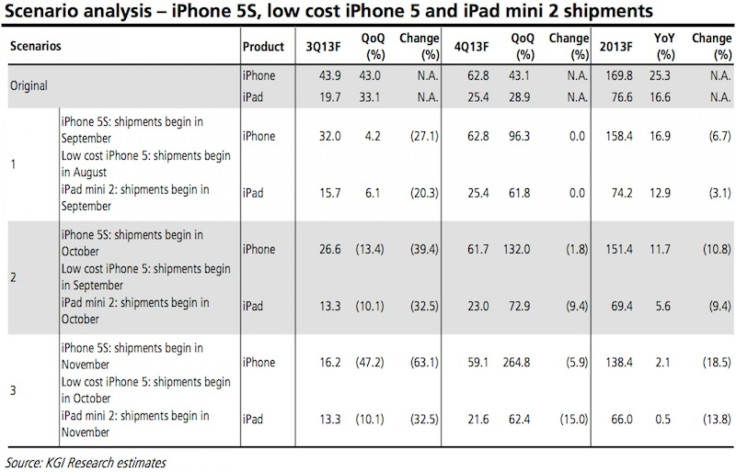Apple iPhone 5S, Low-Cost iPhone, iPad Mini 2 With Retina Display Release May Be Delayed Due To ‘Technical Challenges’
If rumors and speculations regarding Apple’s (NASDAQ: AAPL) product lineup for 2013 are to be believed, the Cupertino, Calif., tech giant is gearing up to release a number of flagship devices, including the next-generation iPhone, unofficially dubbed the iPhone 5S, an entry-level cheaper iPhone, the fifth-gen iPad, aka iPad 5, and the iPad Mini 2.

Many previous reports had suggested that Apple was expected to unveil some of its new iDevices earlier than its usual fall launch. But according to an industry analyst, three of Apple’s upcoming devices of this year will likely be delayed more than previously expected, due to some complex “technical challenges.”
KGI Securities analyst Ming-Chi Kuo, who has a good track record in terms of Apple-related predictions, said in a new research note, obtained by AppleInsider, that the iPhone 5S, the long-rumored low-cost iPhone and the iPad Mini 2 will be launched later than what various reports have been suggesting so far.
Kuo said that mainly two factors are responsible for the delayed launch of the iPhone 5S. According to him, the fingerprint sensor underneath the Home button is posing a number of technical hurdles.
"Apple has to work out how to prevent interference from the black-and-white coating material under the cover glass," he said. "Apple is the first to attempt this function and technology, and time is needed to find the right coating material, which will likely affect iPhone 5S shipments."
Another factor, affecting the release of the iPhone 5S, is the development of iOS 7, the next major version of the company’s mobile operating system. Kuo said the inclusion of the fingerprint scanning technology into iOS 7 could demand more time for software development and testing.
When it comes to the low-cost iPhone model, Kuo said that Apple is facing a tough time in making the plastic shell of the device slimmer.
“The slimmer casing may make it more difficult to ramp up production yields of coating and surface treatment and could slow down the shipment timetable," Kuo said.
As for the iPad Mini 2, it’s the device’s 7.9-inch high-resolution Retina display panels and the thin design that are creating troubles in the manufacturing process.
As a result of the delayed launches, Kuo stated that there will be only single-digit growth in iPhone and iPad shipments in the third quarter of 2013, which is well below the current market expectations of 30 percent to 40 percent growth.
“Earlier, we estimated that shipments of the new iPhone would begin in July (FDD version) and September (TDD version), while iPad Mini 2 would hit the market in August. Currently, market consensus for shipments of iPhone 5S, low-cost iPhone and iPad Mini 2 is July, July and August, respectively,” MacRumors quotes Kuo as saying.
“But in light of publicly available information and our knowledge of technological trends, we now think all three products will begin shipments later than our previous expectation and market consensus.”
Although the analyst has not given any specific date for the upcoming Apple devices of 2013, he provided three scenarios -- August/September, September/October and October/November -- of product releases, showing how Apple’s shipments could be affected by them.

It’s worth mentioning here that Kuo’s new report seems in line with recent rumors saying that iOS 7 is running behind schedule due to a major user interface overhaul that has made Apple bring in its hardware design chief, Jony Ive, to the scene to lead the human-interface team.
Meanwhile, rumors are also rife about the 2014 model of the flagship smartphone, presumably called the iPhone 6. According to reports, the iPhone 6 will be powered by an A7 chip that will be manufactured by Taiwan Semiconductor Manufacturing Co. and not Samsung.
© Copyright IBTimes 2024. All rights reserved.












